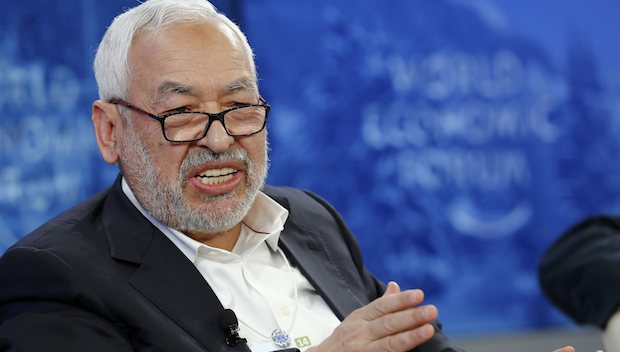
Rachid Ghannouchi, leader of Tunisia’s Ennahda party, attends a session at the annual meeting of the World Economic Forum (WEF) in Davos on January 24, 2014. (REUTERS/Denis Balibouse)
Tunis, Asharq Al-Awsat—Tunisia used the World Economic Forum (WEF) in Davos to call on representatives of countries gathered to fulfill aid pledged to the North African country following the popular uprising that removed longstanding president Zine El-Abidine Ben Ali in 2011.
The 44th annual meeting held in Davos, Switzerland, from January 22 to 25 has an allocated session to discuss North Africa, with Tunisia ranking high on the list of priorities for that meeting.
A number of countries pledged a total of 40 billion US dollars to both Egypt and Tunisia during the G8 summit in June 2011 conditional on those countries transitioning to fully fledged democratic systems following the overthrow decades-long regimes in January of that year.
In its report on last year’s conference, the WEF remarked that some of the “current regimes [in the region were] beginning to resemble old ones.”
Further aid was also promised during the G8 summit of 2011 from the European Bank of Reconstruction and Development and the International Monetary Fund (IMF).
Tunisia is currently in negotiations for a second 500 million dollar tranche of a 1.5 billion dollar loan agreed with the IMF last year, amid an unstable handover of power from the current Islamist ruling party and a number of riots earlier this month following an unpopular 25 percent road tax hike.
The IMF’s conditions for the loan are for Tunisia to reach a political agreement to finalize a transition to democracy and to take effect and to keep under its deficit under control.
Lower levels of tourism since 2011, previously a significant contributor to the country’s GDP, helped widen Tunisia’s current account deficit in 2013 to around 8.2 percent.
Speaking exclusively to Asharq Al-Awsat, financial expert Ezzedine Saidane said that in order for the country to make a recovery, Tunisian’s growth rates needed to be at 5 percent per annum, compared to their current 3 percent.
Tunisia’s inflation rate is currently at 5.8 percent and its budget deficit is expected to widen to 8.8 percent of GDP in 2013.
